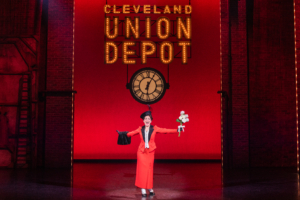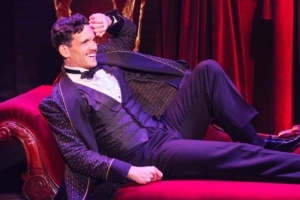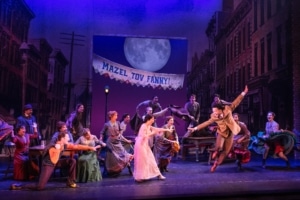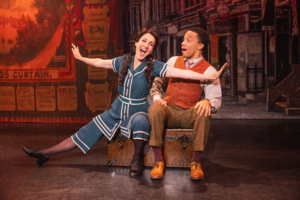DCPA NEWS CENTER
Enjoy the best stories and perspectives from the theatre world today.
Enjoy the best stories and perspectives from the theatre world today.
Funny Girl is the beloved, fictionalized story of Fanny Brice, a comedic actress who rose to fame performing with the Ziegfield’s Follies revue. Brice was married and divorced three times in her life, notably to Nick Arnstein, a convicted conman whose trial was front page news at the time. Her rise in the entertainment industry and tumultuous relationship with Nick is the inspiration for the musical.

Hannah Shankman as Fanny Brice in the National Tour of Funny Girl. Photo by Matthew Murphy for MurphyMade
Born Fania Borach on October 29, 1891, Brice grew up on New York’s Lower Eastside to Jewish immigrants who ran a saloon. She took on the name Fannie Brice as a performer with the Follies in the 1920s, where she became known for disrupting the expectations for women performers by adding humor and wit to the salacious show.
At the core of the musical is also Brice’s journey of self-acceptance, something the actors portraying Fanny (Hannah Shankman) and Nick (Stephen Mark Lukas), can relate to from their own careers in show business. Plus, in this revival, there are new songs, in addition to favorites like “People” and “Don’t Rain on My Parade.” Here Shankman and Lukas talk about stepping into Barbra Streisand’s shoes, developing confidence in the face of rejection, and staying in love with Broadway.
DCPA: What was your introduction to Funny Girl?
Hannah Shankman: My parents always watched Turner Classic Movies, so I watched Funny Girl at a young age, like 7 and my sister was 4. I didn’t know the movie was a musical until I was older, like 17 or 18. I also was aware of the fact that people didn’t do it because Barbra was hard to live up to in the role as Fanny. I had an audition for a regional production in 2016 in Missouri. We only did 12 performances and that was my real introduction to the musical.
Stephen Mark Lukas: I didn’t hear about it until I got to NYU and my Jewish friends talked about it. My very first voice teacher in college said to me “you’re going to play Nicky Arnstein one day.” I didn’t know what that meant at the time. When I heard about the revival, I watched the movie all the way through and was cast as Nick’s understudy on Broadway. Now, I’m playing the role on the tour.

Stephen Mark Lukas in the National Tour of Funny Girl. Photo by Matthew Murphy for MurphyMade
DCPA: I want to dig into the themes of Funny Girl, and one of them has to do with navigating a career in show business. Do you remember your first professional audition?
Shankman: I’m from New York, and I remember I snuck out of school to audition for the Vanessa Williams revival of Into the Woods. I obviously didn’t book the show. That was a good early introduction to how rejection works in our business. I also auditioned for 10 musical theater BFA programs for college and didn’t get into any of them. I developed a thick skin very young and, like Fanny, wouldn’t take no for an answer. I re-auditioned for programs and wound up going to the University of Michigan. “No” does not mean you’re not talented in this business; it just means you’re not the right fit right now.
Lukas: My very first professional audition was for a regional production of The King & I. I remember it very well because I was 11 years old. I booked the role because I was the only one who could do a British accent. I played Lewis who is Anna’s son. I remember when it was over being distraught for weeks, and it was because I had found my tribe of theater people.
DCPA: What has been the thing that has helped you remain resilient and withstand rejection? What would you say to young actors?
Shankman: You’re allowed to feel rejected in this business, but you’re also allowed to feel celebrated and resilient. A lot of that comes with having a supportive community outside of the business that will help you through the harder moments and celebrate you through the more glorious moments.
Lukas: The key for me is realizing it’s a business. I have been in so many auditions as a reader or behind the table and the conversations about casting often have nothing to do with how talented you are. Honing in on that which makes you special and capitalizing on that is the key to longevity in this business.

National Touring Company of Funny Girl. Photo by Matthew Murphy for MurphyMade
DCPA: In your research for the roles, what are some things you learned about the real Fannie Brice that surprised you?
Shankman: I read a book about Fannie before we started the show. When Nick was going to trial, he had a falling out with his lawyer, Bill Fallon. To appeal to Bill, because she was afraid that if he didn’t take the case Nick would lose, she named their child William. Bill still refused to take the case and he lost. She loved this man so much and she believed in his innocence.
Lukas: The thing that got to the heart of the relationship is that at one point Fannie said that Nick was the love her life, but she never knew if he was telling the truth or not. That’s something I took and built this character on. He’s a chameleon.
DCPA: In Funny Girl, Fanny sings about how her features that identify her as Jewish make her less beautiful.
Shankman: I think throughout the show, Fanny looks to Nick for acceptance and affirmation. It’s hard to believe you’re beautiful when the world is telling you otherwise. In real life, I think Fanny struggled with that a lot. After her and the real Nick got divorced, she got a nose job and changed the narrative about herself.

Hannah Shankman and Izaiah Montaque Harris in the National Tour of Funny Girl. Photo by Matthew Murphy for MurphyMade
DCPA: What is your favorite part of the show and what’s the most challenging?
Shankman: My favorite part is doing “People” with Stephen. It’s the first time in Act One when everything gets quiet and you feel the intimacy between Fanny and Nick. The hardest part is that I’m onstage for the entire show. I have 22 costume changes; it’s a beast of a role, but very rewarding.
Lukas: Audiences know the song “People” and once Hannah starts singing, you feel the audience breathe this sigh of relief because it’s this moment in the show they’ve been waiting for. That’s one of my favorite things about doing revivals—surprising the audience with moments they’ve been expecting and coming at them in a different way.
DETAILS
Funny Girl
Dec 10-22, 2024 • Buell Theatre
Tickets
